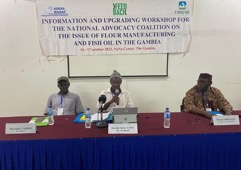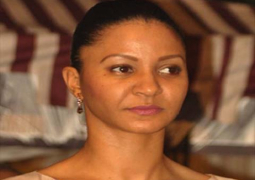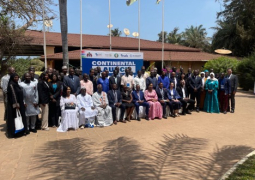
The West African Association for the Development of Artisanal Fisheries (WADAF), based in Senegal, on 16 and 17 October this year held a convergence at the NaNA conference centre to edify and upgrade the Gambia's National Advocacy Coalition on the issue of fish meal and fish oil industries in The Gambia.
The workshop looked at “the perception of artisanal fishing professionals about the negative impacts of the fish meal and fish oil industries in The Gambia”.
Professionals and fish players across various organisations and communities in the country were assembled to give critical consideration to the impacts of the fish meal and oil industries in The Gambia, drawing case studies from similar happenings in sister countries such as Senegal and Mauritania.
While the fisheries sector is strategic for The Gambia, as it contributes to food and nutritional security, job creation and the provision of wealth for the State and communities, “Gambian fishing is faced with irresponsible fishing practices and IUU fishing which constitutes a tragedy for the economy, the State” and especially the coastal communities.
“This unfortunately results in a scarcity of certain coastal demersal resources as well as coastal pelagic resources in particular, which particularly perniciously affects the trade balance, the food supply of populations and the livelihoods of artisanal fishing communities,” WADAF states.
According to WADAF’s Executive Secretary Moussa Mbengue, the fishmeal and fish oil industry was introduced in most African countries in a context of abundance and deficit of development, to generate added value from unsold fish catches, scraps and waste. “Its development is also linked to the increase since the 1980s in intensive aquaculture throughout the world, the feed used being based on fishmeal (5Kg of fresh fish/1Kg of fishmeal),” he said. “The feed of chickens and pigs also requires fish meal as a protein source. Flour and oil are the most common ingredients mixed with other ingredients (grains and additives) to produce fish feed (ABP).”
However, he said, stakeholders in the fisheries sector “denounce the serious impacts of these fishmeal factories” in terms of fishingovercapacity on already overexploited species, environmental nuisances and pollution and the disruption of the artisanal processing of fishery products and fish trade in particular but also of their social and economic repercussions.
“These professionals are concerned about the conditions of authorization for the establishment of fishmeal manufacturing plants,” he said, adding: “They question compliance with the requirements of environmental and social impact studies (ESIA) and deplore not being sufficiently involved in the consultation process.”
Mr Mbengue calls for partnership between countries especially in protecting natural resources. “It’s also important that we build our capacity in ensuring that we live up to expectations and also increase our advocacy,” he said.
Speaking on The Gambia’s environmental laws, NEA’s Snr Programme Officer Lamin BJ Samateh said the country has very robust and essential laws that are geared towards protecting the environment from such issues as the negative impacts of fish meal and oil manufacturing. While there is some amount of lull in observance, he said the Agency is adamant to ensure due diligence with respect to observing the country’s environmental laws.
In his remarks, Mustapha Yarboe, coordinator of the small-scale fishers association in The Gambia, underscored the significance of the forum, describing it as timely in consideration that it would avail them the opportunity to discuss thoroughly and come out with recommendations that are geared towards the protection of the country’s fisheries sector.
“We need to come out with good recommendations for the betterment of the fisheries sector before there is problem,” Mr Yarboe said.
WADAF Gambia coordinator Dawda Foday Saine dwelled also on the importance of the convergence, saying it would go a long way in strengthening their partnership with other key stakeholders and players within the country’s fisheries sector. “We have to work together with the desire of ensuring that we protect our fishing industry for the betterment of our future generation,” he emphasised.
The two-day convergence is expected to strengthen the advocacy skills of participants, develop elements of an operational action plan for advocacy against the negative impacts of fish mealand fish oil units, and produce a report that allow the Gambia Fisheries Administration to understand the issues better.
Participants were drawn from Gambia National Advocacy Coalition, Fisheries Department, the NEA, RAMPAO, ADEPA, Tryosters, and fish meal factories.




